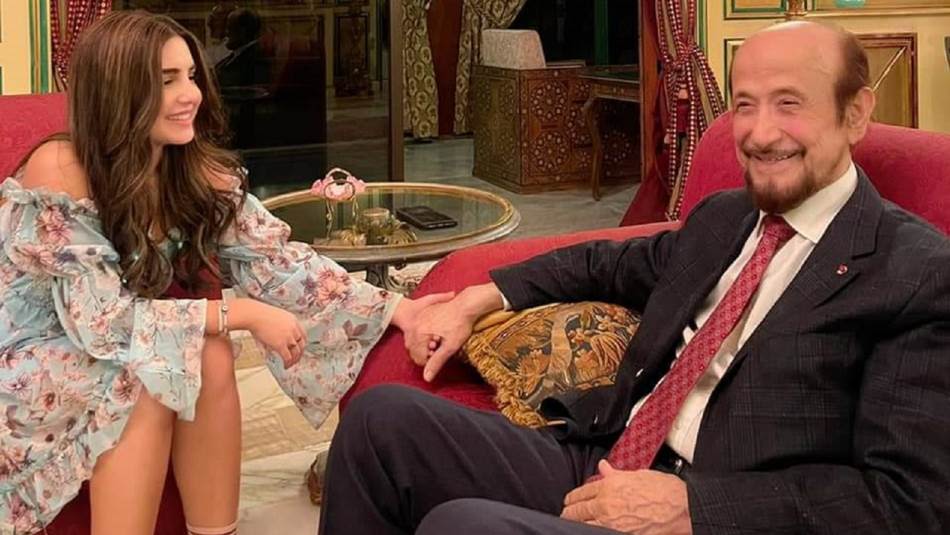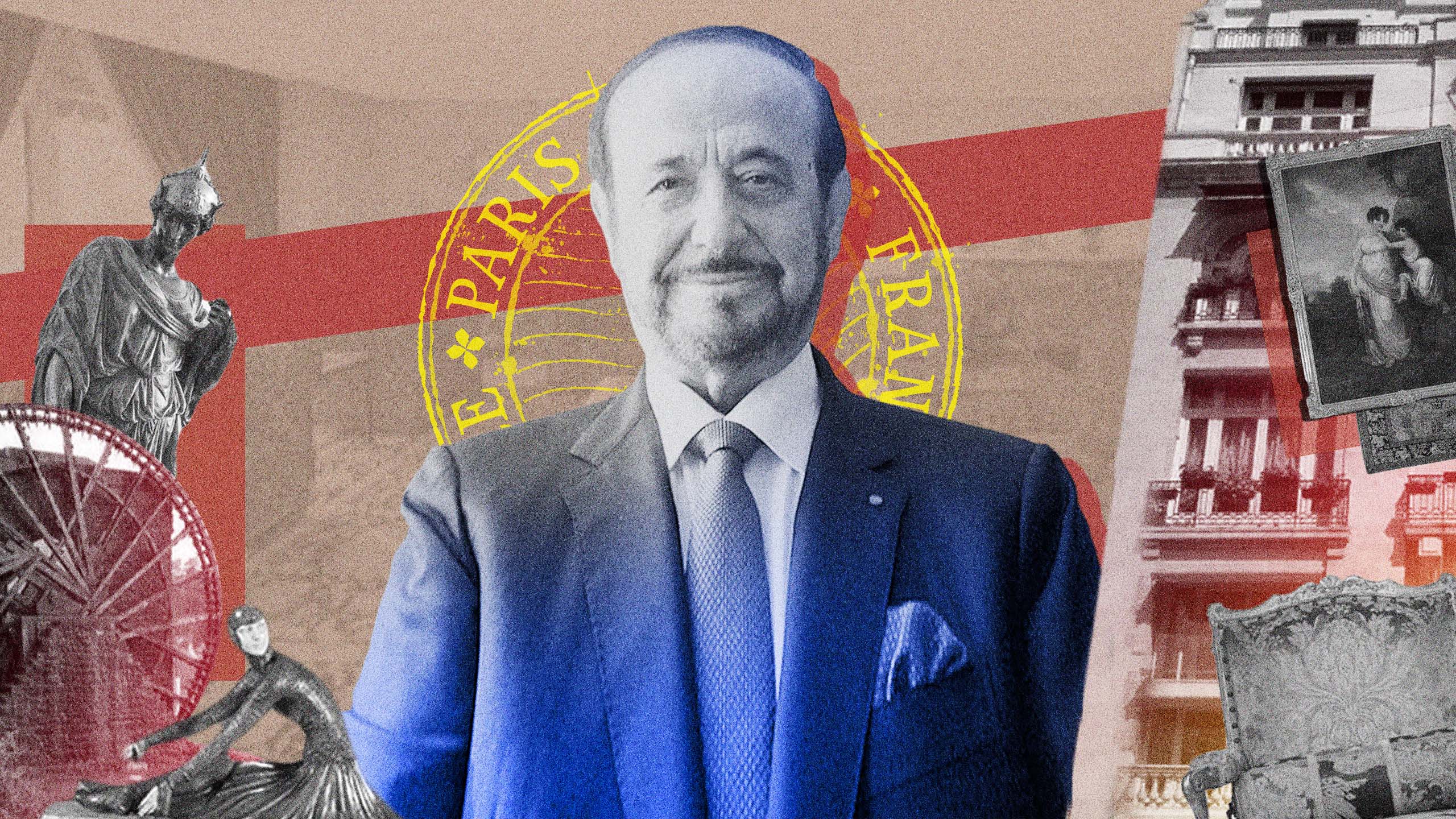
Suspicious Auction About Rifaat Al-Assad's Empire in France and the Lack of Justice
Report: Mohammed Al-Haj – Edited by: loujein Haj Youssef – Visual Designer: Deliar Ali
“2000; .. 12,000; .. 20,000; .. 30,000 .. Sold” .. at the ninth hall of Hôtel Drouot located in the center of the French capital, Paris, 535 pieces of a luxurious palace have been held for sale at an auction.
The attendees enthusiastically exchange views about each piece; they raise the price or withdraw, without knowing that all these pieces may belong to the palace of the person who is called as “the butcher” by many Syrians.. Rifaat Al-Assad.
Rifaat Al-Assad is the uncle of the head of the Syrian regime, Bashar Al-Assad, former vice president of Syria, who has been residing in Europe since 1984. In September 2022, he was sentenced to a four-year imprisonment in France, after he was charged with money laundering as a part of a gang, embezzlement of Syrian funds and tax evasion during the period from 1996 to 2016, in pursuance to the judgment rendered by the French Court of Cassation.
The Court of Cassation, the Supreme Court in the French judiciary, rejected Rifaat Al-Assad's final legal endeavor, and rendered a final verdict to imprison him for four years in a lawsuit of "illegitimately" acquiring real estates valued at ninety million euros.
The "ADER" auction house booked an entire floor to display luxury collectibles, and the most prominent hall in the hotel to display the contents of a palace located in the prestigious Avenue Foch in Paris, and put a condition that payment for the sale must be in cash.
There are attendants in the hall, buyers over the phone, and many Syrians and Arabs participating in the auction. Identity of the owner is kept undercover and ambiguous, and there are doubts about some of the attendants being relatives of Rifaat Al-Assad.
Rozana was there, contacted the auction house, inquired about the owner of the 500 pieces, and examined the surroundings of the palace. We also searched for details about Rifaat's real estate empire in Paris and its surroundings.
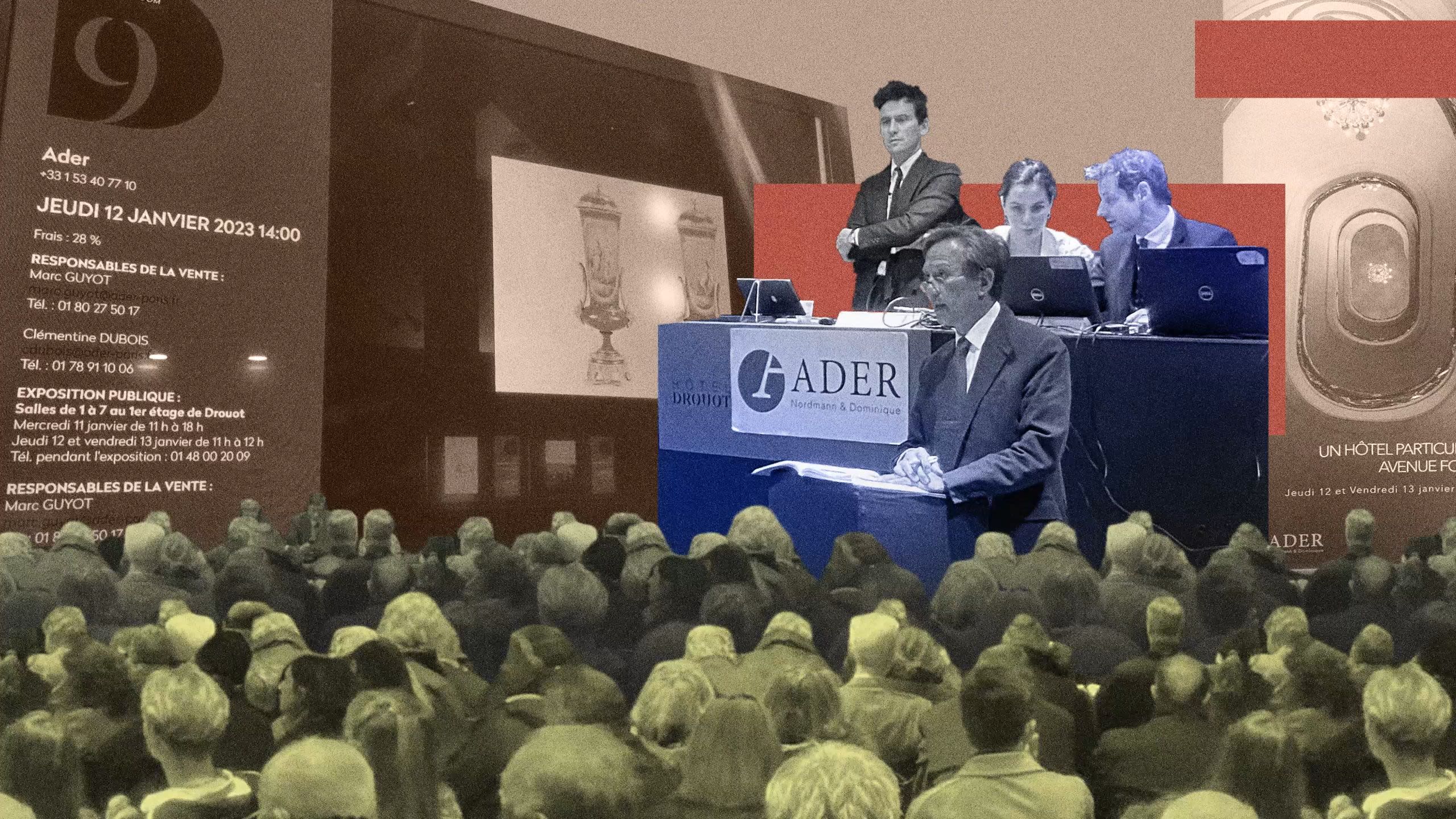
The auction.. Arabs and Syrians are outbidding and the seller is anonymous!
We entered Hôtel Drouot located on an avenue full of galleries selling rare, luxurious and precious items. Halls of the first floor are entirely dedicated to displaying pieces of furniture, utensils, paintings, chandeliers, mirrors and carpets.
There are dozens of antiques and vintage gilded cabinets; one is made in the style of Louis XVI and a piece of furniture with a value estimated at thirty thousand euros, which looks like pieces in the Versailles Palace. You witness a "special amazing show"
In the ninth hall, ADER's employees are putting on display the collectibles piece by piece for sale. They provide simplified description and clarification of each piece, phone lines are available, they keep moving from one bidder to another, and amounts are in thousands and tens of thousands of euros each time.
A Syrian young woman called (A.F) is curious enough to attend the auction, she told Rozana: “Nobody utter the name of Rifaat Al-Assad here. Do these people know that the person who killed Syrians in Homs and Hama, and plundered our funds, used to sleep and sit on the lavishly royal properties? He was eating with a golden spoon for years while we live in poverty there! He steps on a luxurious Iranian carpet on the ground and hangs on the wall a painting sold for tens of thousands of euros while people are starving in Syria!!”.
The young woman, who preferred not to mention her name, leaves the hall: "I feel like I can’t breathe here. I wish I hadn't come. I’m so angry and oppressed because of what I see happening in front of me. It is a sale of a part of what Al-Assad’s family plundered from Syria.
How could Rifaat live such a lavish and luxurious life? How did he escape? Who will get all these millions? This life is unfair.”
The young woman was not the only Syrian attendant. On the second day of the auction, we noticed a number of Arabic speakers, especially those who can speak in the Syrian tongue.
The upper hand in the first row is to a sixty-year-old woman wearing a hijab and expensive clothes. She most likely does not buy or bid. She exchanges conversations and whispers in Arabic only with other women sitting around and behind her, they have been present throughout the sales process.
Rozana could not bring to light the identity of any of them, it also could define whether they belonged to "the entourage of Rifaat Al-Assad” and his relatives who are there to monitor the sale or buy specific pieces". The young woman (A.F) also has said: "They are subject to suspicion. Could a twist of fate bring together Syrians, Arabs, a woman who appears to be from the Gulf, and another who sits in the first row watching the sale of the contents of the Palace of Rifaat?!
A good amount of the pieces in the auction have been sold to people on phone, in addition to others in the hall, some of whom seemed to be interested in buying and reselling the pieces, as they roam between the different auctions held in the hotel.
We tried to jump to a conclusion from the auction house about the identity of the owner of the pieces while mentioning the name of Rifaat Al-Assad directly, for being the owner of the palace for years.
After a long wait and many calls, it was not possible to get an answer at the hotel, but we got a brief response via email later, to many questions, most of which were ignored.
"The seller's identity information is confidential, and as a broker I have no right to disclose it. However, I would like to inform you that the seller is not the person you mentioned (Rifaat Al-Assad) and that the sale is completely voluntary.”
“The sale is completely voluntary” means that the 500 pieces belong to an unknown third party (not Rifaat Al-Assad nor France that confiscated his property), which also leaves room for assuming that the sale is made by one of his close associates, it is a possibility.
The "Sherpa" association, which filed a lawsuit against Rifaat before the French courts in 2013, had previously published a warning, through its director, Sandra Cossaret, after the conviction of the uncle of the regime's president months ago: “France should ensure that assets would not be returned to corrupt people."
Until this article’s date of publication, Rozana did not receive any response from "Sherpa" regarding information about the last owner of Rifaat Al-Assad's palace and its furniture in Foch, and the nature of the confiscated assets, whose value is estimated by the court at 90 million euros in France.
Sale of the pieces has been completed at prices higher than the initial ones. For example, paintings dated back to the late eighteenth and early nineteenth centuries, one of which is by Julius Noel with his signature, was sold for 15 thousand euros instead of 2 to 4 (its initial price), a second oil painting by Paul Fischer was sold for 17 thousand, and a third by André Borrel was sold for 17 thousand.
At the end of the auction, the "anonymous" owner of the pieces got about 3.3 million euros, according to “le quotidien de l’art” website, and the new buyers got the huge mirrors, chandeliers, vases bearing the emblems of Napoleon I, gilded Italian consoles and exceptional paintings dated back to the eighteenth century and etc, including the special gilded dining set bearing the initials of Rifaat Al-Assad “rea".
Final prices of pieces can be found on the auction house website.
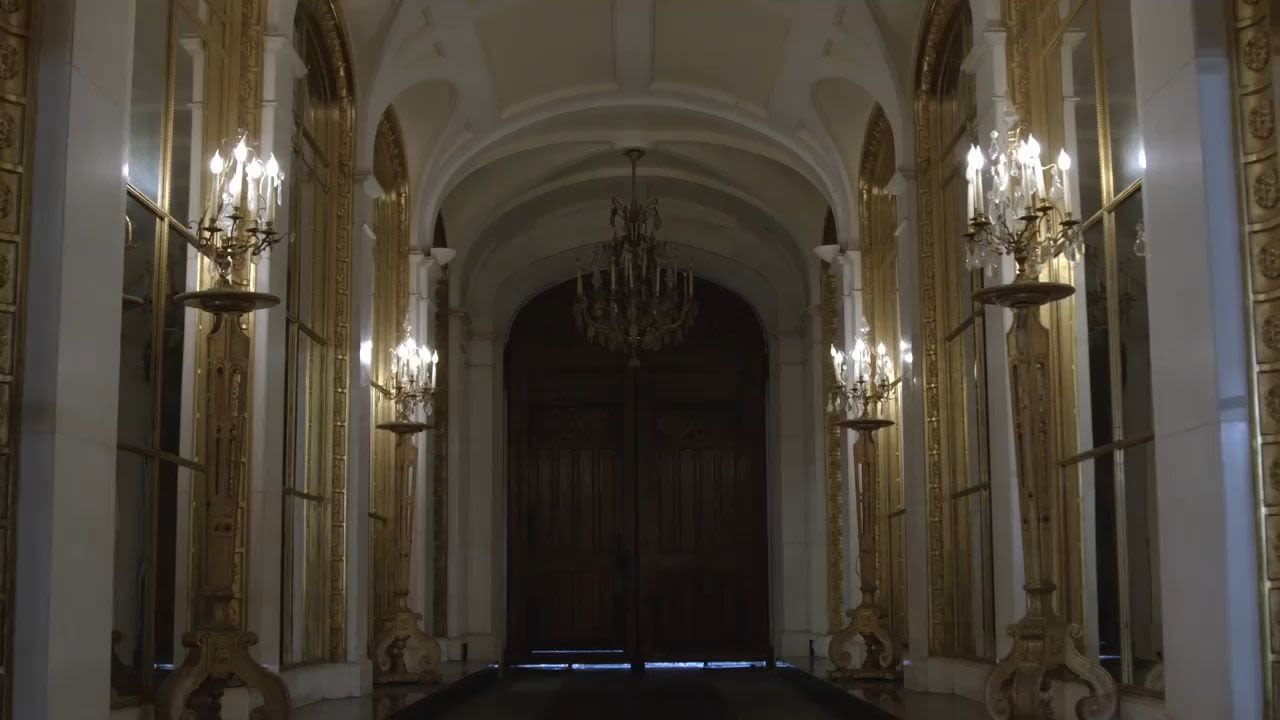
In Evidence.. Contents of the auction belong to the Rifaat Al-Assad’s palace
The report editor took pictures of pieces of furniture that were displayed in the auction and others that appeared in pictures of Rifaat Al-Assad in his palace on Avenue Foch.
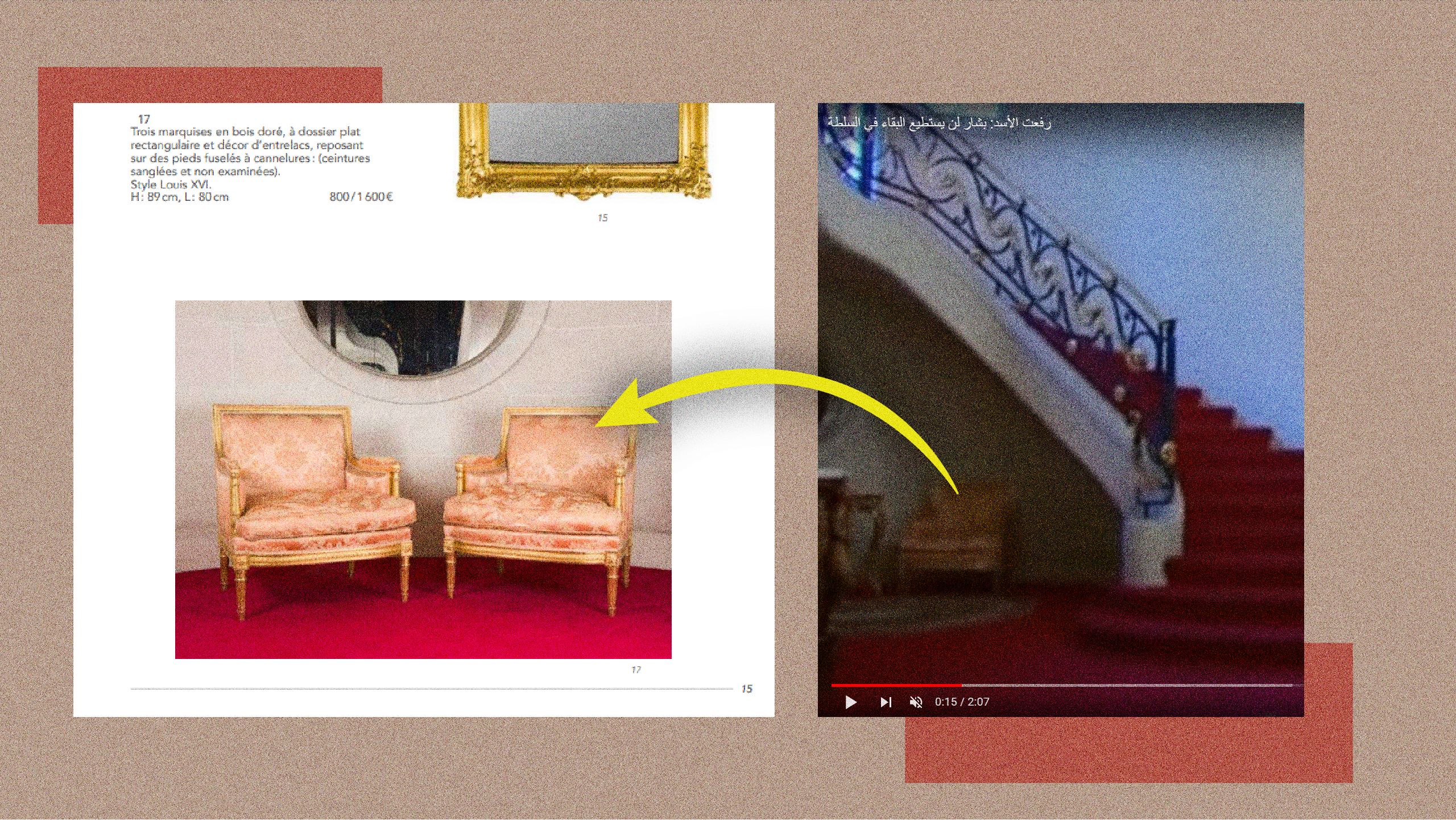
All the results, samples of which are provided, prove without any doubt that the five hundred luxurious pieces were once in Rifaat's palace. However, we could not be confident about the owner of them.
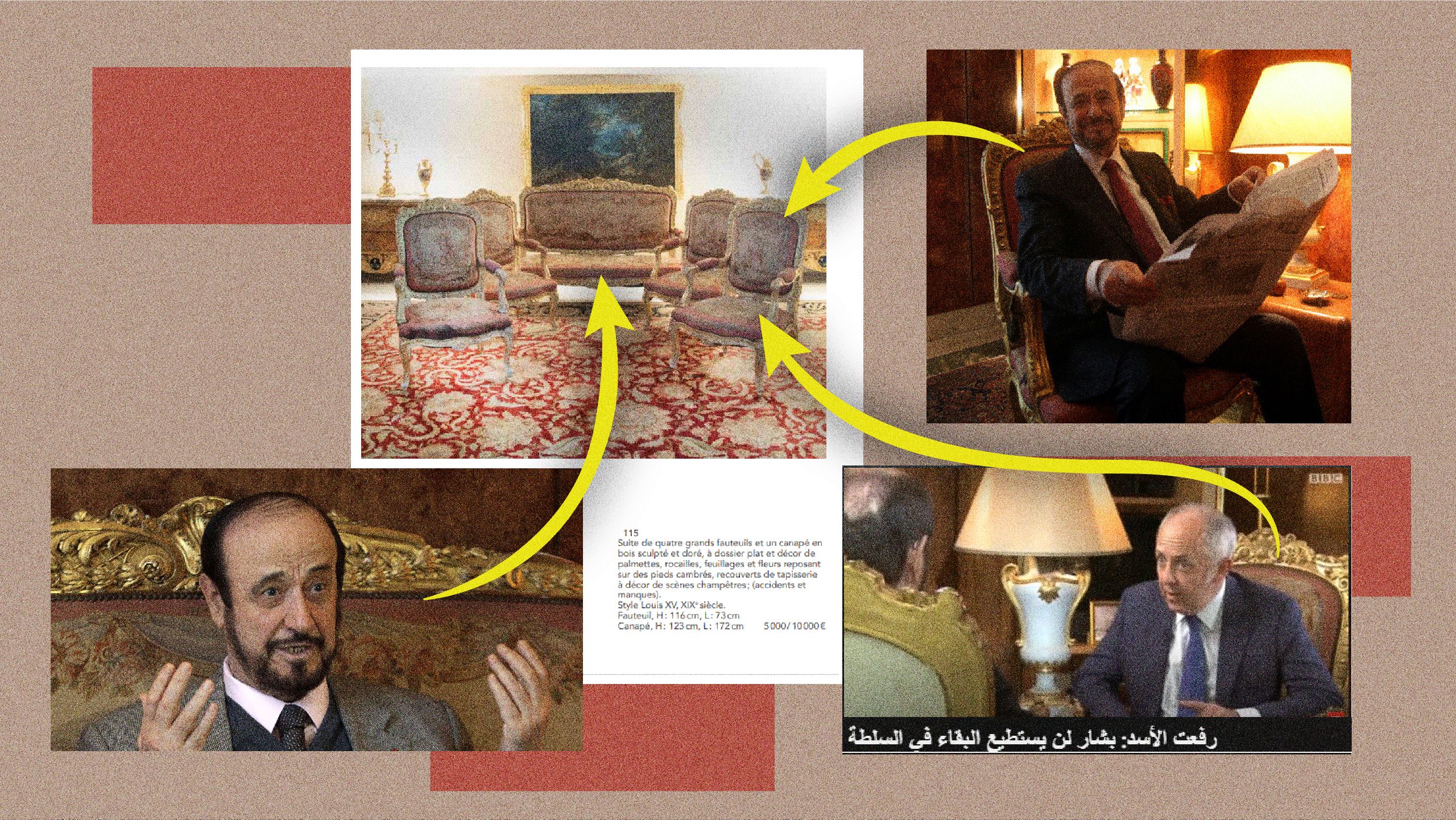
This is a statue that appeared at the beginning of a BBC interview with Rifaat Al-Assad, published on April 4, 2012 on YouTube. It was in the showroom and in the catalog on pages 16 and 17.
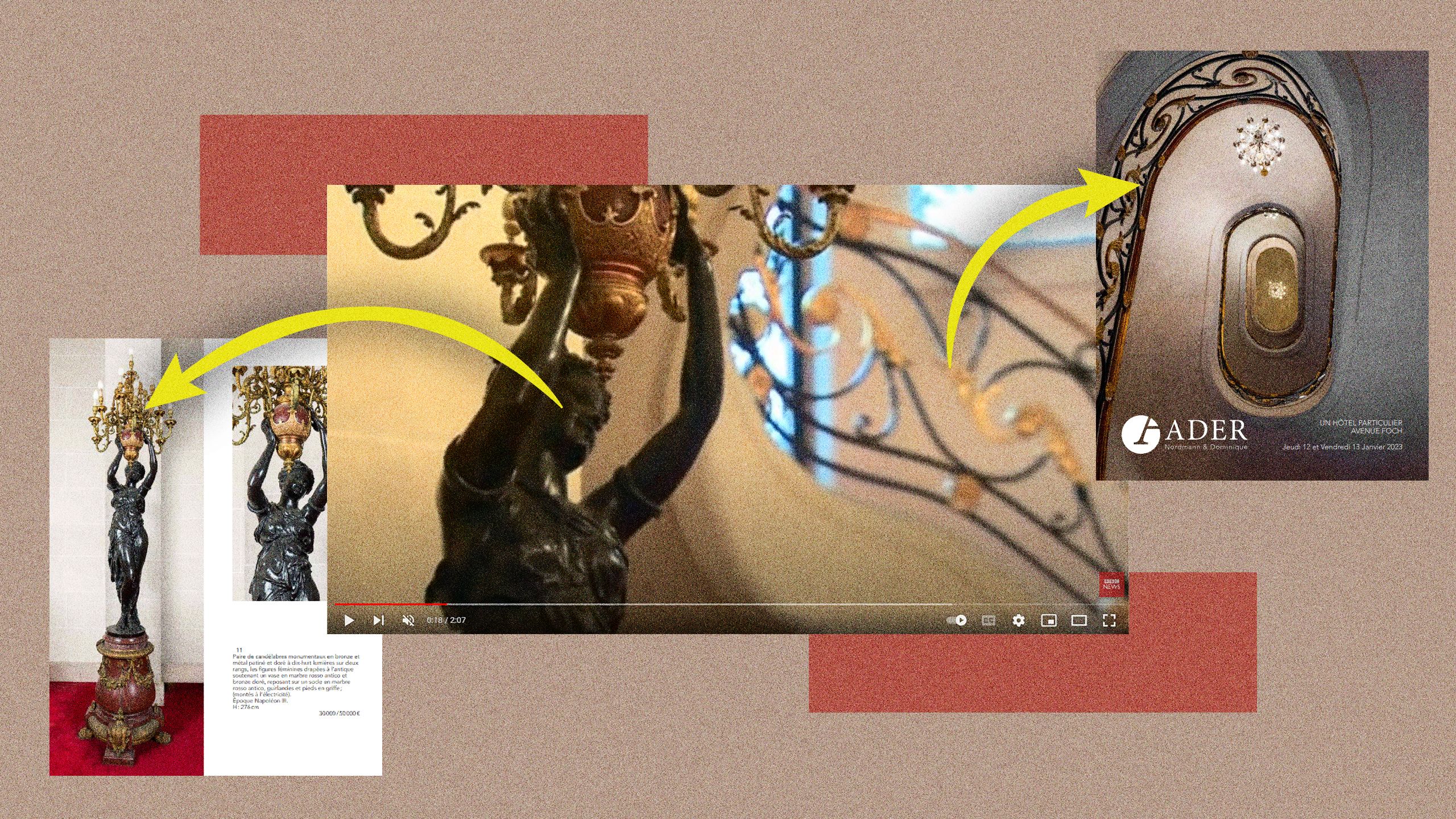
The statue, which represents a female figure holding a gilded-bronze marble vase and dates back to the era of Napoleon III, had an initial value of 30 to 50 thousand euros.
The cover picture of the auction catalog for the palace staircase with a black gilded “handrail", which appeared at the beginning of the BBC report as well.
Photo of the Associated Press agency in Rifaat's office at the Foch Palace, with a "Dutch School" painting on page 47 of the auction catalog in the background. Its initial value is estimated at around 4,000 euros.
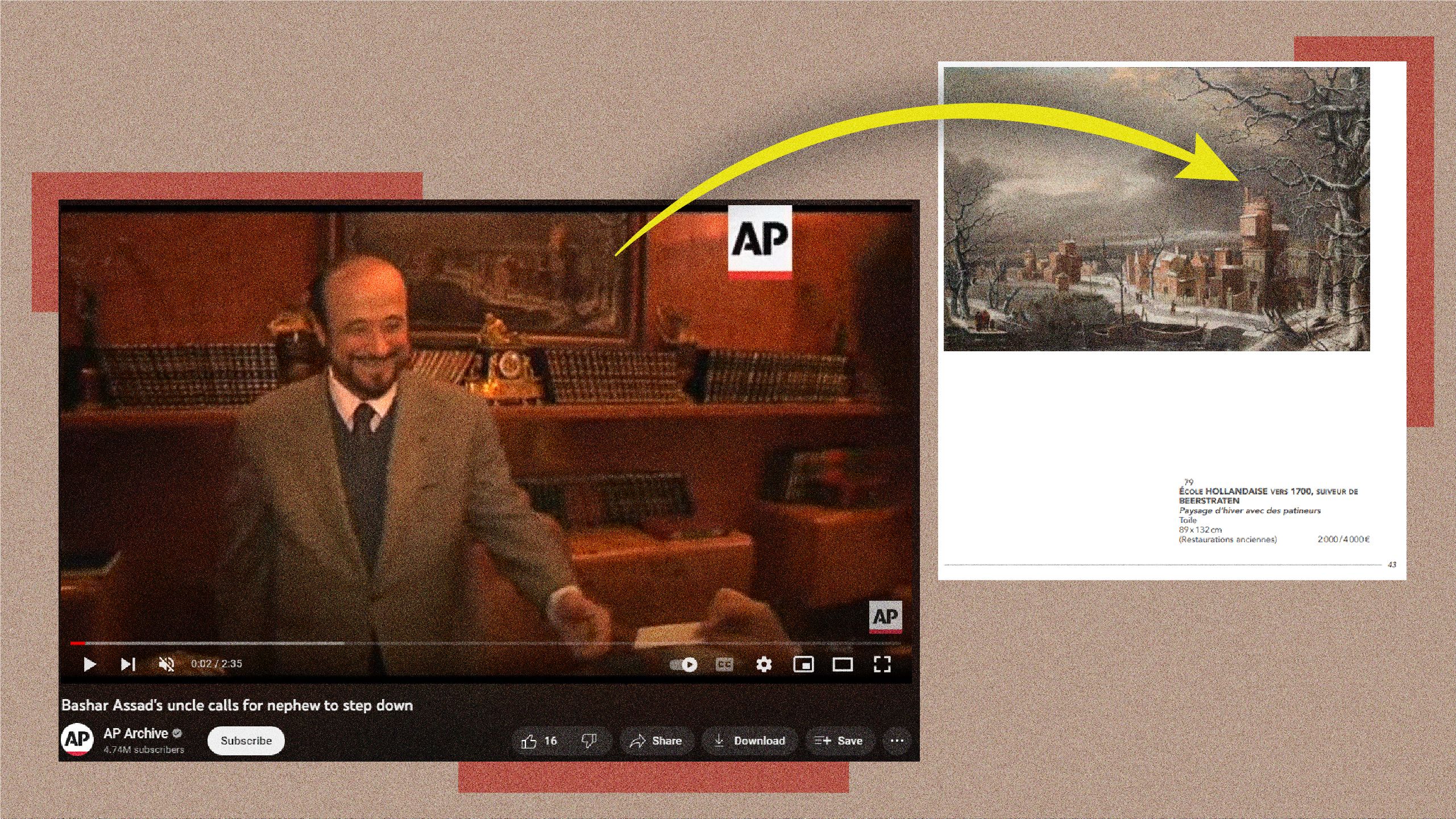
A photo of a Western news agency, showing Rifaat in front of two paintings, a furniture chair, and a display case, found in the catalog on pages 49, 69, and 240.
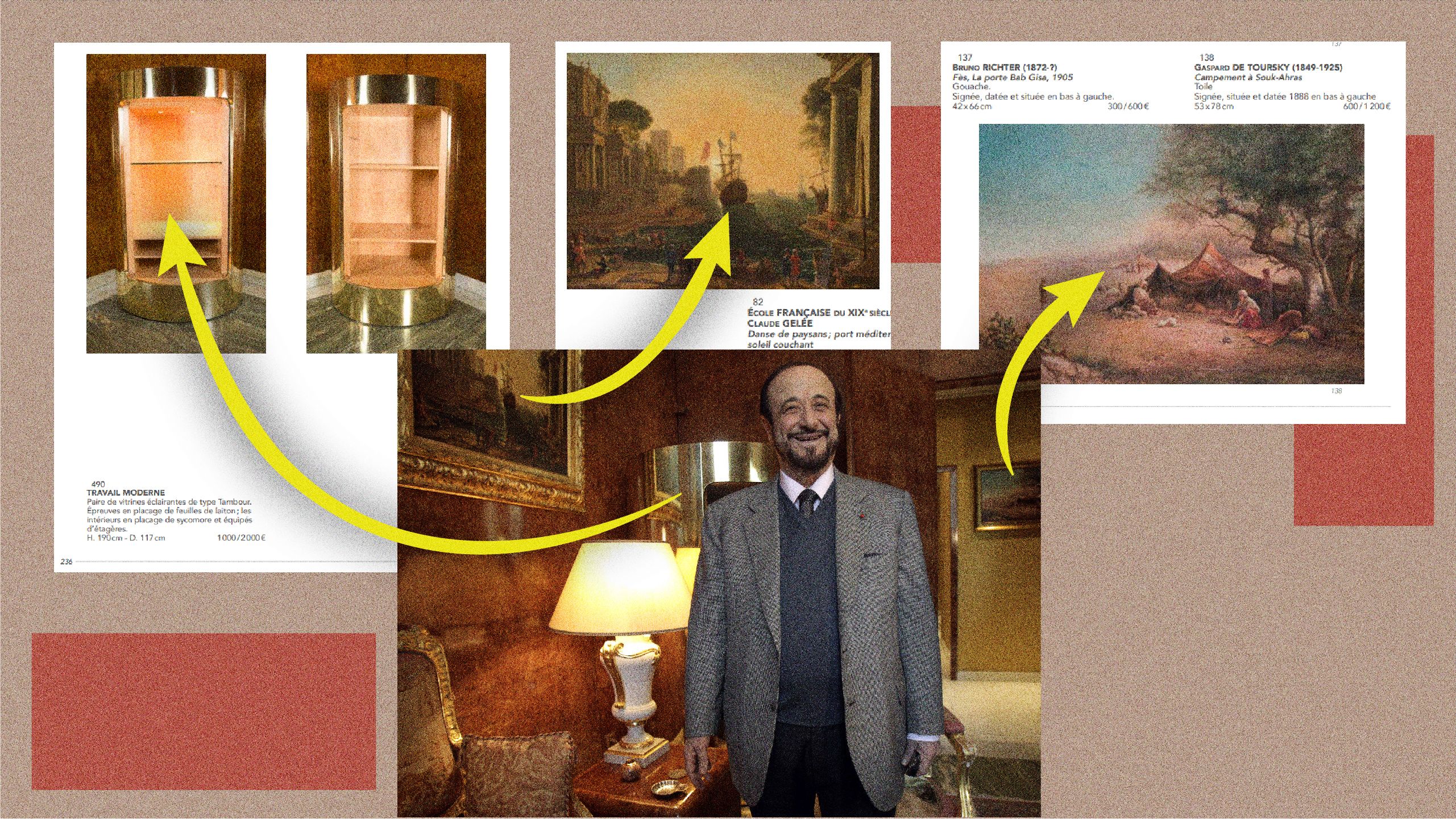
The same chair appeared in Rifaat's interview with BBC.
As for the chair shown in Rifaat's interview with Channel 4, it is displayed as a part of the dining room in the catalog, page 35.
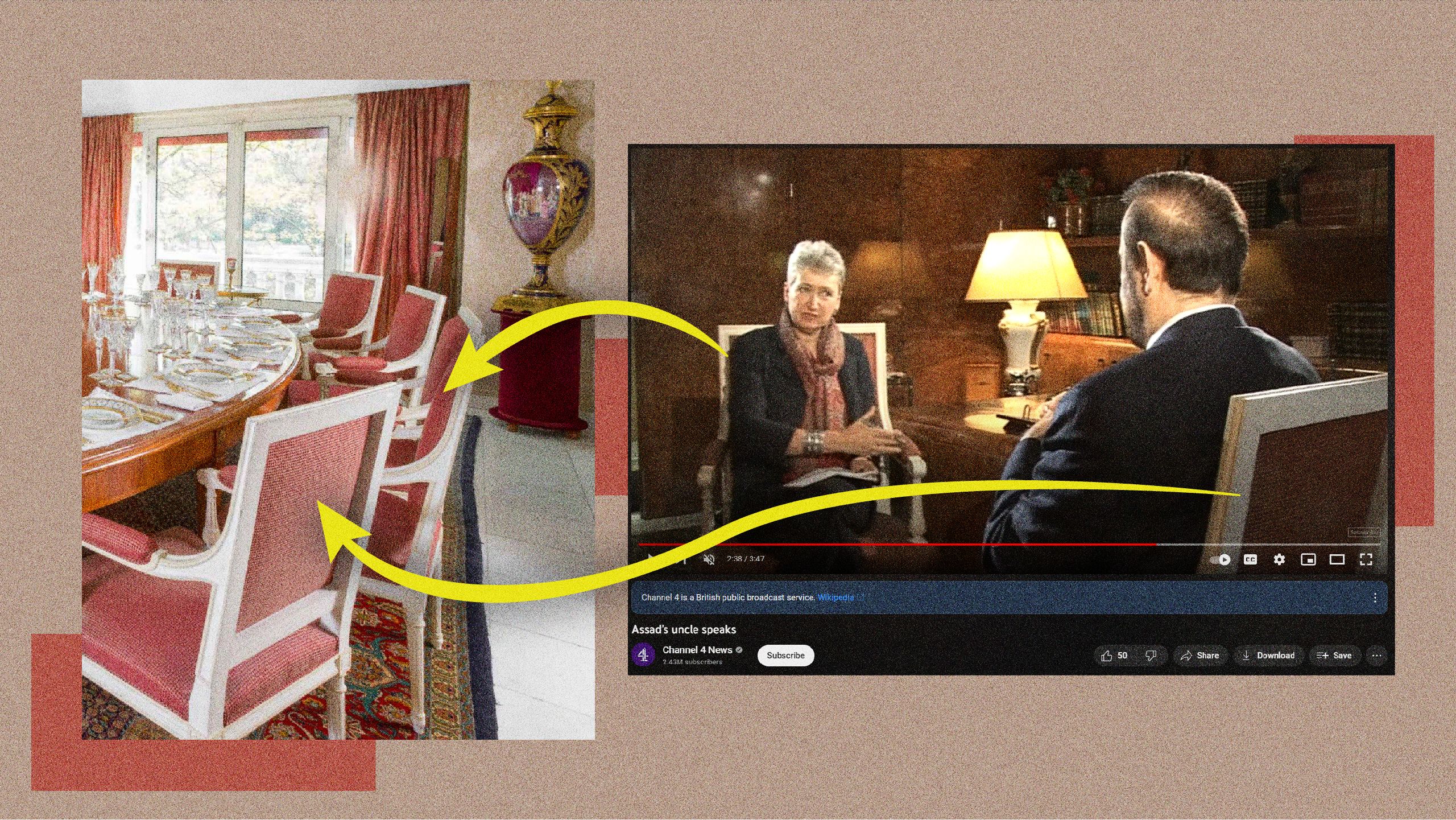
Rifaat Al-Assad's lawyer, Elie Hatem, claims in a statement to "Middle East Eye" that the auction items belong to the third floor of the Foch palace, which is owned by one of Rifaat's ex-wives.
To refute the allegation, we conducted an analysis of the building's facade and pictures of the living, dining and sleeping rooms in the palace whose contents were sold at auction.
By comparing the architectural parts visible in the pictures (the railings of balconies, the shape of the windows and external doors, and the external space surrounding the building), it is proven that the contents sold in the auction belong to different floors of the palace.
An interior designer spoke to Rozana about an approximate view of the location of some rooms on the floors.
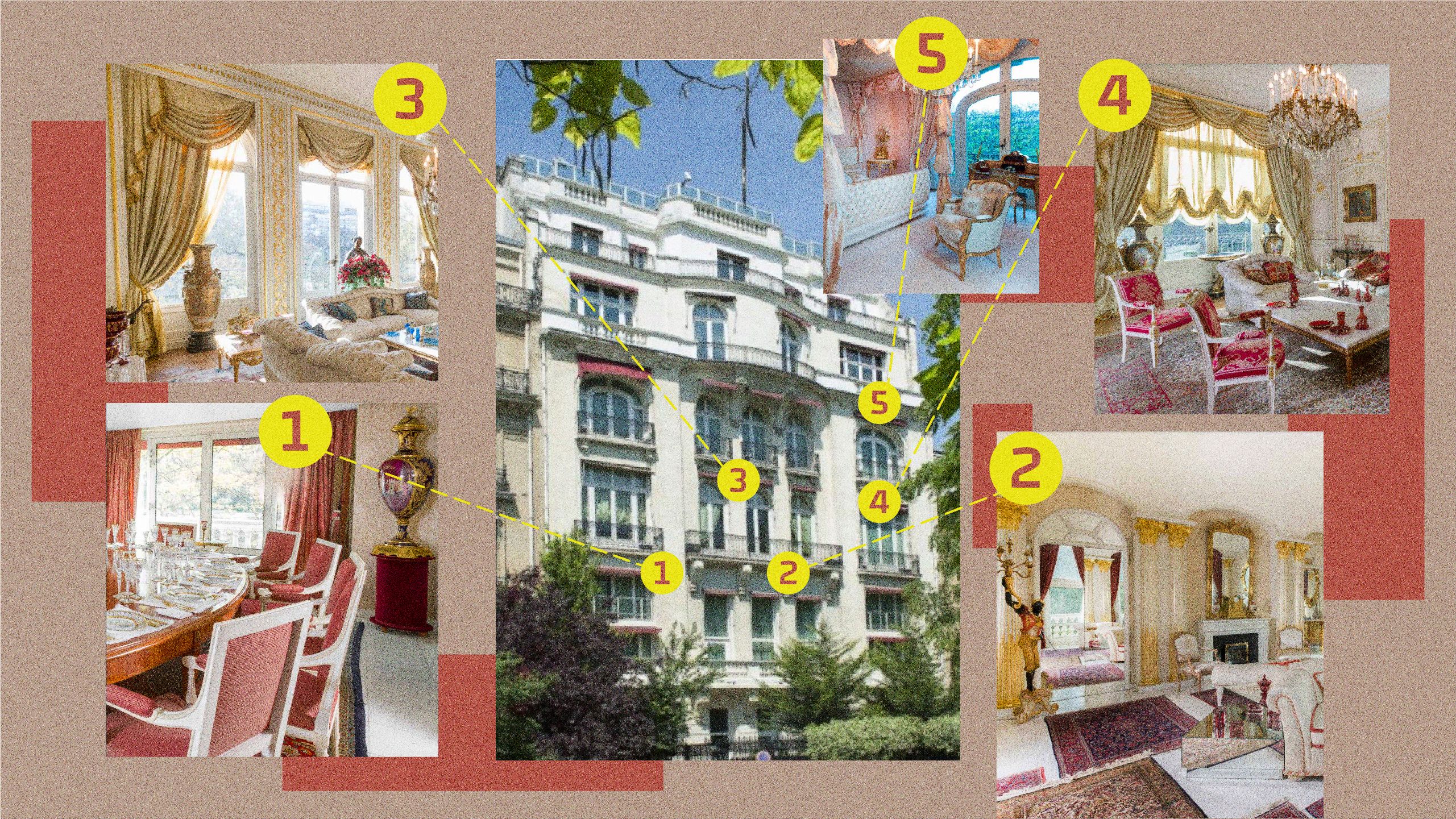
What do we know about Rifaat's properties in Paris?
With a view of the Eiffel Tower and only hundreds of meters away from the Arc de Triomphe in the center of Paris, Rifaat Al-Assad’s former palace is located on the luxurious Foch Avenue. The palace was Rifaat’s residence in France, and was where he conducted many video interviews. Recently, its contents were offered for sale at the "ADER" auction.

It remains unconfirmed whether the “Foch Palace" is among the confiscated real estates, these assets, as some reports indicated, or Rifaat managed to sell it before the verdict was issued.
Specialists assured Rozana that the video and pictures published by the auction house from inside the palace are recent. This means that the contents of the palace were not evacuated when the confiscation decision was rendered.
There was previous information that Rifaat Al-Assad sold the palace at the beginning of 2013, in return for about 70 million euros, according to a report by the “Telegraph”.
During efforts to leave no stone unturned in open sources, Rifaat Al-Assad appeared in September 2013 with the British "Channel 4", from his palace in Foch, i.e., months after the news of the sale was published.
The French newspaper "Le Monde" stated in a previous report that this sale did not take place, as the amount provided by Russian buyers is very low (70 million euros), compared to the required amount (90 million), in light of the interest of Russians and Saudis to buy Rifaat Al-Assad's palace.
A few days ago, the reporter went to the palace surroundings in the evening, to check its current situation and if anyone lives there. The floors are abandoned and the building is dark in the cold weather, and there are no signs of life except for a light emanating from the end of the tunnel leading to the parking lot.
The luxurious palace, which consists of seven floors and has a total area of more than 1,500 square meters, is located in the 16th arrondissement, No. 38, avenue Foch, which is considered by real estate experts to be the most expensive in Paris.
According to a journalist in "Liberation", "Le Monde" points out that the palace is inhabited by one of the four "Assad" wives, and it has been put up for sale since 2009, and is registered in the name of a company in Marabella, Spain, where Rifaat owns large real estates.
We asked the “Sherpa” association about the “Foch Palace” and if it was among the confiscated assets, especially since its value is almost equal to the full amount announced for all confiscated properties (90 million euros) in the court’s decision in 2020.
Bessancourt Farm.. Rifaat's armed men near "France's Nuclear Computer"
On the outskirts of a forest in the town of Bessancourt, in the vicinity of Paris, Rifaat Al-Assad owned a huge property of about 45 hectares, including a villa (castle), an indoor swimming pool, a stable for horses, and housing for about 90 people of his entourage.
“Shortly after I was elected in 2001, I was warned of this situation by public information (...) I was advised to leave him (Rifaat) alone and not to cause conflicts. Yet, we asked his armed guards to be careful, they frightened the hikers”, the former mayor of Bessancourt, Jean-Christophe Boullet, told “La Gazette de L’oise” in 2013.
The mayor wonders then how a man accused of committing a massacre in the city of Hama in 1982, is allowed to settle only a few hundred meters away from the Tavernay-Bessancourt Air Base, which until 2006 housed the Special Operations Command, and in which the "nuclear computer of the President of the Republic" was located.
The First Justice of the Peace in Bessancourt pointed out that Rifaat supported many associations in the city to ensure no one would be interested in his real estate, with some of the local residents protesting against the activities of his entourage.
During our research, we came across the claim of "YouTuber" Matthew Mayot that he surreptitiously entered in early 2019 to the abandoned palace of Rifaat in the Bessancourt forests, as he succeeded in filming an indoor pool while his attempts to enter the palace went in vain. The clip also showed abandoned cars and residents of a nearby building, who are believed to be the entourage of Bashar Al-Assad’s uncle.
It is mentioned that Siwar and Sumar Rifaat Al-Assad confirmed in previous statements that the horse farm is a "Saudi gift to their father" while a source from his entourage indicated that it was a gift to Rifaat's wife, from her sister who is married to the former Saudi King Abdullah bin Abdulaziz. Meanwhile, the French judiciary says that such assets are made by funds embezzled from "The Treasury of the Syrian State".
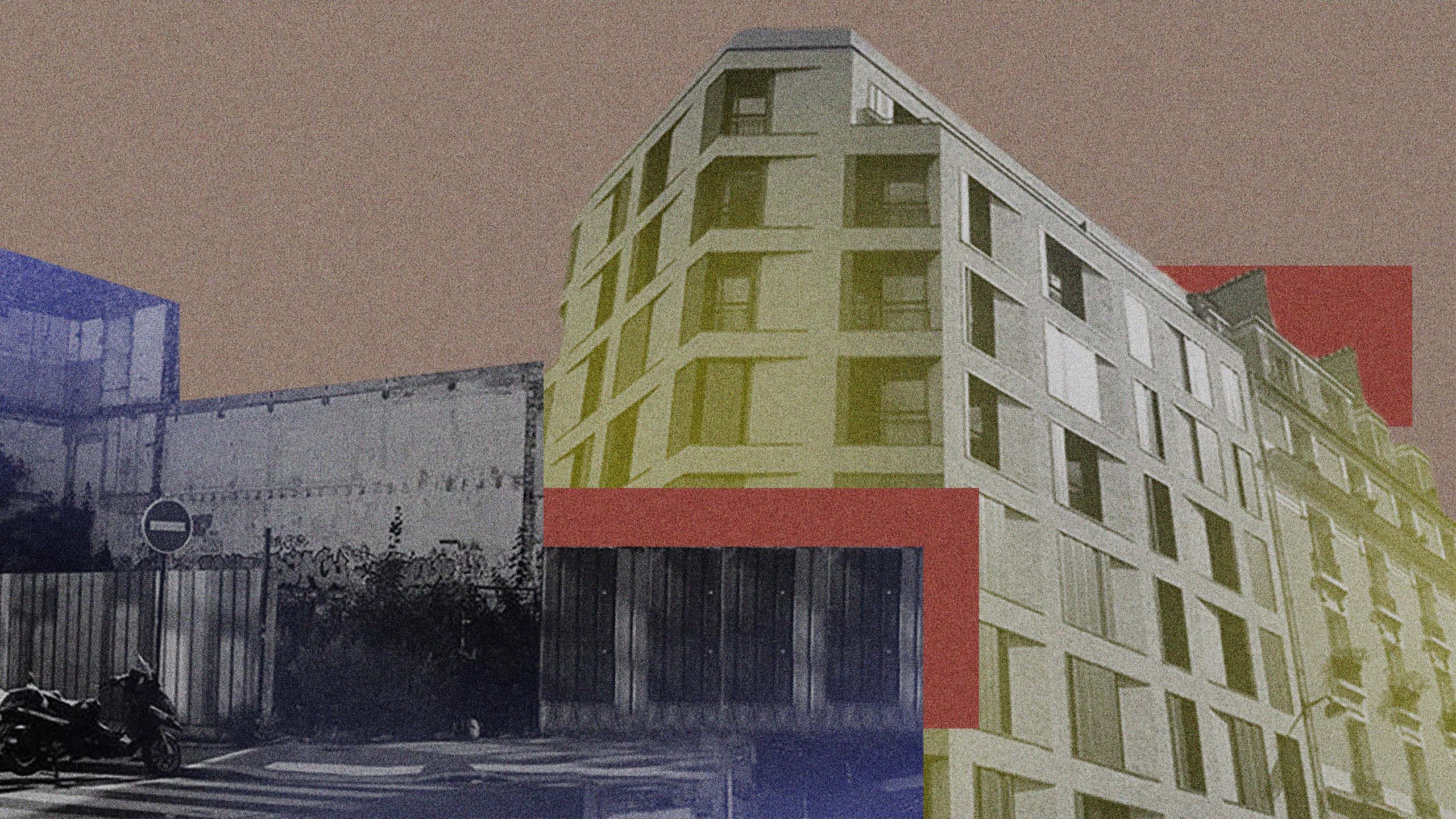
The luxurious land of Rifaat inhabited by rats for twenty years?!
An empty plot of land in the 16th arrondissement, at the corner of Henry Hine and Jasmine Streets, has been littered with rubbish and inhabited by rats for twenty years, and the town council cannot control it.
The owner of the land, according to two council members, is Rifaat Al-Assad.
After the case was reconsidered and a demand was raised to the confiscation of the land, Rifaat submitted a license in March 2013, authorizing building an upscale residence of six floors and thirteen apartments on an area of 2,360 square meters, according to the Association for the Protection and Promotion of Historic Paris.
Ten years ago, two right-wing elected officials, Lawrence Dreyfus (Union of a Popular Movement) and David Alphand (dissident from the Union of a Popular Movement) tried to push the state to go after the real estate assets of the Assad family in France. Alphand expressed his confusion at the lack of response and interaction with their calls.
Rifaat's attempt was worthless after the 16th arrondissement municipality of Paris confiscated the land by a court decision in 2015, and recently opened 34 social housing units on the land located in one of the most prestigious neighborhoods in western Paris.
The Deputy Mayor stated: "What a joy, it's a building with a special history, we became the owner of this barren land by confiscation."
France, Spain and London .. A billionaire real estate empire!
Rifaat Al-Assad’s property in France is not limited to the assets mentioned above. There is a building on President Kennedy Avenue, another on Citron Street, and a palace on Lambela Avenue in Paris, in addition to offices in the city of Lyon. This is only what was revealed by human rights activists and press reports, which is totally estimated at about 160 million euros.
With a view on Seine River, and in an upscale neighborhood in the 16th arrondissement, Siwar Al-Assad accompanies a journalist from the French "BFM TV" channel, on a tour in his house, where he resides when he visits France from Britain.
A report by "Libération" newspaper indicated that Rifaat Al-Assad's total wealth in Europe is estimated at one to two billion euros: "Rifaat Al-Assad has bank accounts in Gibraltar, Nicosia, and other places that are described as havens for tax evasion in the world."
The newspaper reveals, as per the prosecution, that "Rifaat owns a fortune of no less than one billion euros, after proving his ownership of a holding company in Luxembourg, and a number of other properties distributed over Liechtenstein, Panama and Curaçao”.
In addition to that, Spain confiscated about 500 properties of Rifaat Al-Assad, worth about 700 million euros, which he bought with “illegal funds”. Reports also indicate the existence of properties in Britain, Luxembourg, and Switzerland indicate, through fake companies registered in the names of his sons and wives.

How did he get all of this?
Rifaat Al-Assad (85 years old) did not leave Syria on his own, but at the request of Hafez Al-Assad, as the former Libyan Prime Minister Abdel Salam Jalloud, who witnessed the details of his exit from Syria at the time, says.
Jalloud spoke during a video interview with "France 24" published last July, about the role he played in facilitating Rifaat Al-Assad's exit from Syria in the eighties.
Libya supported Syria with an amount of 200 million US dollars, in order to be presented to Rifaat Al-Assad for leaving Syria, after the latter asked for this amount in exchange for being exiled with his 48-member family. Abdul Salam Jalloud, Libyan Prime Minister during the Gaddafi era
Hafez asked Jalloud, upon his visit to Damascus, to persuade Rifaat to leave the country in order to avoid destruction, which the latter agreed to in return for facilitating a trip to the Soviet Union and a sum of money amounting to $200 million, which was approved.
For its part, the Public Prosecution Office in France states that Rifaat Al-Assad’s wealth came from the treasuries of the Syrian state, and believes that he benefited from funds, which his brother Hafez Al-Assad agreed to release in exchange for his exile, based on notes made by a Swiss bank, and the Syrian budget in that time and testimonials.
The prosecution relied on testimonies, including those of former Syrian Vice President Abdul Halim Khaddam; in which he said that Hafez Al-Assad paid 300 million dollars to his brother in 1984, as a way to get rid of him after the failed coup attempt. Two-thirds of the amount was taken from the president's budget and the remaining third was a loan from Libya.
“Rifaat Al-Assad's men transported vehicles loaded with cash from the Central Bank”. The French prosecution also is consistent with what was said by the former Syrian Defense Minister, Mustafa Tlass
Another witness added to the French investigators that Rifaat Al-Assad stole a "treasure of great value" from a land owned by his grandfather in Syria, while Rifaat Al-Assad rejected the accusations and considered them attempts by his opponents to get rid of him.
Rifaat Al-Assad, his sons and lawyers say that he accumulated his wealth from "continuous and massive" financial assistance that was granted to him by Saudi King Abdullah bin Abdulaziz since he was a crown prince until his death in 2015.
Refaat alleges that he left Syria without owning anything, and gave everything he owned at the time to the poor, while testimonies from Syrian politicians indicate that the "Defense Brigades" that he headed had broad powers and an open budget.
He also claims that he is a politician who does not care about his property and is not aware of investments. “They bring me papers to sign. I don't know how to pay the money. even for restaurant expenses.”
However, the French Court of Appeal questioned this argument after relying on phone recordings revealing that an accountant was "regularly" informing Rifaat Al-Assad about the status of his real estate properties.
Rifaat Al-Assad's lawyers submitted documents proving that he received four Saudi donations: The first was in the year 1984 and the other three were between 2008 and 2010. The French judge accepted only the first donation of $10 million, while he saw that the other 3 donations were too late to justify the fortune that was collected in the eighties.
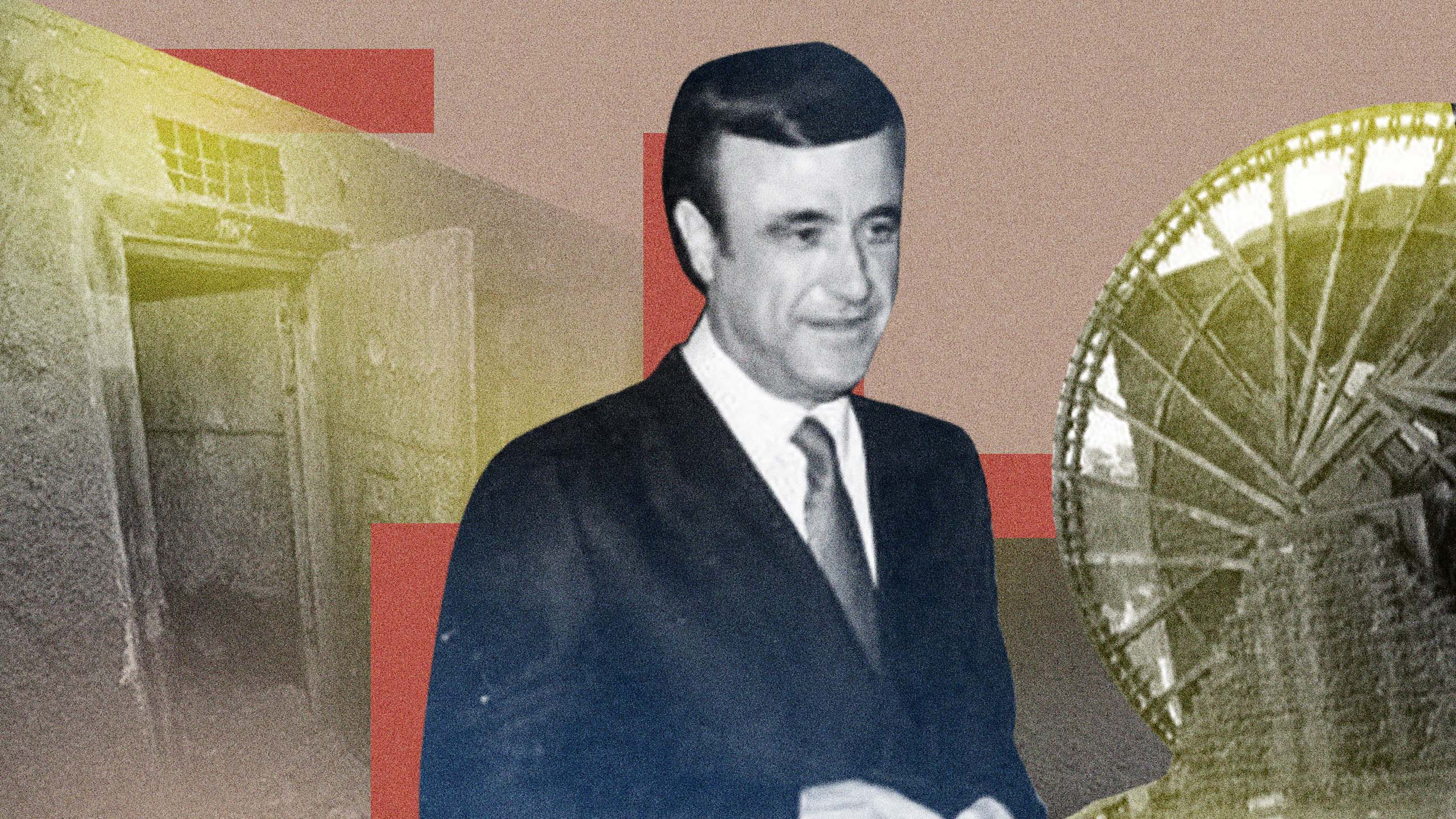
Delayed incomplete justice.. and Rifaat who ran away to Syria
After nearly thirty years of residence in Europe, moving between his wealth in Switzerland, Britain, France and Spain, and facilities for residence with his entourage and awarding him the French Legion of Honor, European justice is achieved "lately and incompletely" as described by jurists. All trials and confiscation of his assets and the accusations did not prevent him from returning to Syria at the end of 2021.
Human rights reports indicate that the majority of Rifaat Al-Assad's properties in Europe are registered in the names of his wives and children and their companies.
In 2017, after a delay of years, the Swiss courts considered a complaint filed by the non-governmental organization “TRIAL International" against Rifaat Al-Assad, on charges of committing two massacres in the 1980s in Syria, and thus became known as the "Butcher of Hama", with estimates indicating his direct responsibility for the killing 10 to 40 thousand Syrians within days.
The organization also stated that, in 1980, Rifaat Al-Assad deliberately killed about 500 to 1,000 detainees in the notorious Tadmor military prison. This was a revenge targeting unarmed prisoners, after his brother Hafez was subjected to an assassination attempt, from which he miraculously escaped.
In turn, the French authorities ignored for many years reports and questions about Rifaat's huge "illegal" wealth, to open an investigation about it in April 2014, after the issue was raised by the "Sherpa" and "Transparency International" groups.
After two years of investigations, the former Defense Brigades commander was charged with tax evasion and embezzlement of public funds. The French authorities seized Rifaat's assets, and a four-year prison sentence was issued against him.
As for Spain, the Supreme Court announced in 2019 that it was going to file a lawsuit on charges of money laundering against Rifaat Al-Assad, after confiscating real estate worth more than 600 million euros two years ago, which is believed to have relation to him.
Britain, as well, confiscated real estate for Rifaat Al-Assad and refused to grant citizenship to one of his four wives and three of his children.
The owner of the real estate empire lives his last days in Syria, which he reached without major obstacles, and recorded his last appearance with his granddaughter and his family there, in a palace that appears to be no less luxurious than his property in Europe.
With Rifaat escaping European justice, and a number of his children and wives living in Britain and France, the questions of the young Syrian woman attending the auction remain pending without any clear answer: "What will history say about the thirty years of lavish luxury that “the butcher” lived in Europe? What is the size of the properties already confiscated? Will the Syrians ever witness real accountability and complete justice!”
